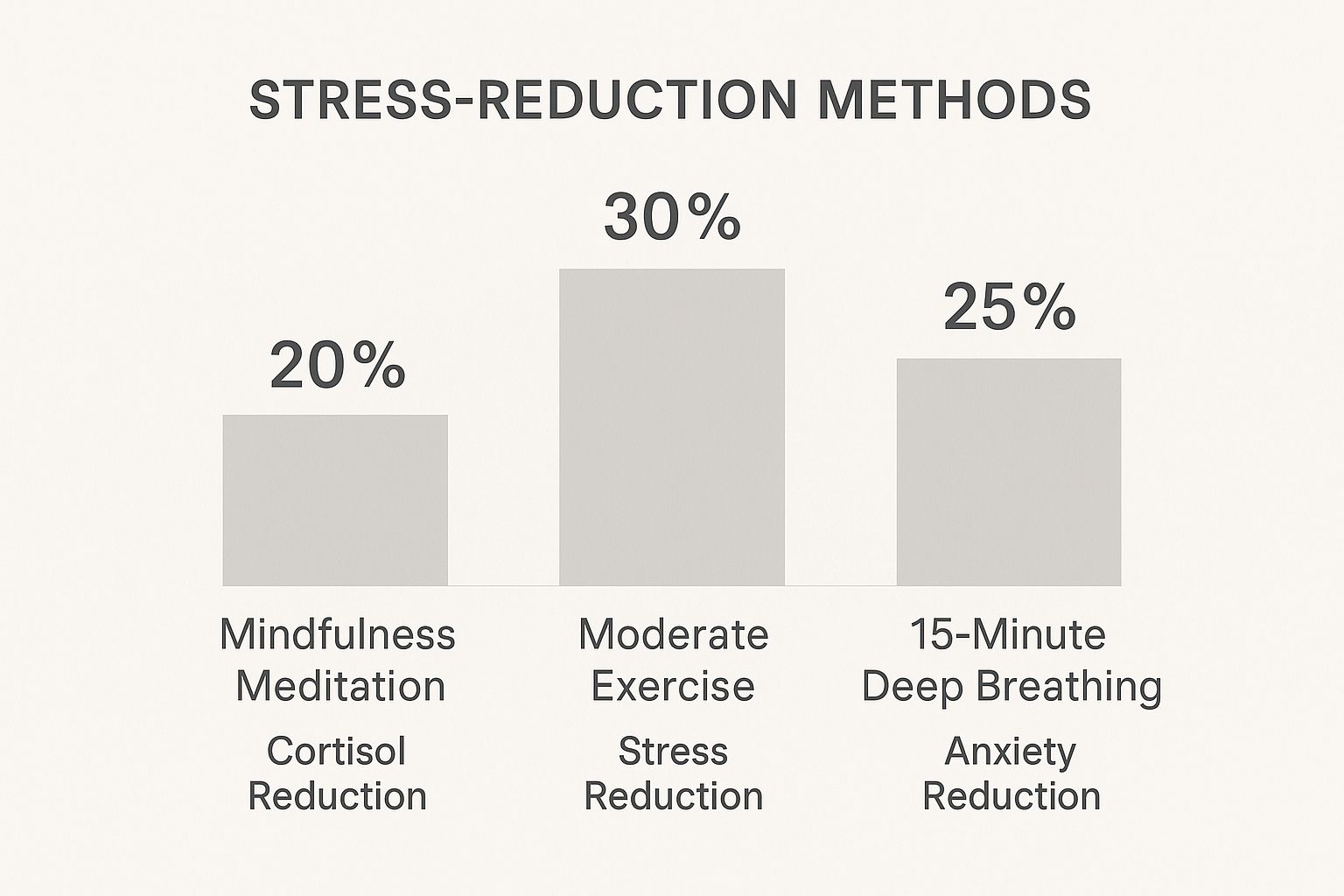When we talk about strengthening your nervous system, it’s really about building resilience through small, consistent daily habits. Think quality sleep, a nutrient-rich diet, smart stress management, and mindful movement. It’s less about a quick fix and more about creating an internal environment where your nerves can truly thrive, equipping you to handle whatever life throws your way.
Your Nervous System and Why Its Health Matters

Picture your nervous system as your body's incredibly intricate communication network—the command center for every single thing you think, feel, and do. It’s made up of two main parts: the central nervous system (your brain and spinal cord) and the peripheral nervous system (that vast web of nerves connecting the central hub to every other part of your body).
This is the system that lets you snatch your hand back from a hot stove, feel the warmth of a hug, and coordinate all the complex movements involved in just walking across a room.
A resilient, well-regulated nervous system is the absolute foundation of your overall well-being. When it’s functioning at its best, you’ll notice a huge difference in your daily life.
- Balanced Moods: You feel more emotionally stable and aren’t constantly thrown off by sudden waves of anxiety or irritability.
- Sharper Focus: Concentrating on tasks at hand becomes so much easier, and that feeling of mental fog starts to lift.
- Better Stress Response: Your body can handle stressful events effectively and, just as importantly, return to a calm, relaxed state afterward.
- Improved Coordination: That mind-body connection feels strong and seamless, leading to better physical performance and a greater sense of awareness.
The Growing Need for Proactive Care
We simply can't overstate how important this system is, especially when you look at what's happening globally. Neurological conditions have now become the world's leading cause of disability and poor health.
It's a staggering reality. A landmark report revealed that in 2021, these conditions impacted over 3.4 billion people across the globe. That’s roughly 43% of the world's population. This growing burden really underscores the urgent need for all of us to take proactive, daily steps to protect our neurological health. You can dig into the full details of this study on the World Health Organization website.
When your nervous system is consistently overtaxed, it can lead to a state of dysregulation. This isn't just a fleeting feeling of stress; it's a persistent state where your body feels stuck in "fight-or-flight," leading to chronic issues.
Recognizing the signs of this imbalance is the first, most crucial step toward getting back on track. You can learn more about the specific signs in our guide on what is a dysregulated nervous system. This knowledge will empower you to actively build a stronger, more adaptable nervous system for lasting vitality.
The Nutritional Foundation for Your Nerves
The food you eat is so much more than just calories for energy. It's the literal raw material your body uses to build, repair, and maintain the intricate wiring of your entire neurological framework. Making conscious, nutrient-focused food choices is one of the most powerful and direct ways you can support your nervous system from the inside out.
Your nerve cells, or neurons, fire off electrical signals to communicate with each other, and that entire process depends on a steady supply of specific vitamins and minerals. When these key nutrients are missing, communication can get sluggish, and the protective sheaths around your nerves can even start to break down over time. This leaves your system far more vulnerable to stress and less efficient at regulating everything from your mood to your focus.
Micronutrients Your Nerves Depend On
To really understand how food strengthens your nervous system, we have to look at the specific micronutrients that play starring roles. These aren't just "healthy" in a generic sense; they have precise jobs that are critical for neurological function.
- B Vitamins (B12, B6, Folate): This group is a true powerhouse for nerve health. Vitamin B12 is absolutely essential for creating and maintaining myelin, the protective fatty sheath that insulates nerve fibers—think of it like the plastic coating on an electrical wire. A deficiency here can lead to serious nerve damage. Meanwhile, B6 and folate are crucial for producing neurotransmitters like serotonin and dopamine, which are key for regulating mood and stress.
- Omega-3 Fatty Acids: Found in abundance in fatty fish like salmon, chia seeds, and walnuts, these healthy fats are vital components of brain and nerve cell membranes. They are fantastic at reducing inflammation, which we know is a major contributor to nerve damage and dysfunction. A consistent intake helps support clearer brain-body communication.
- Magnesium: I often call this the "relaxation mineral." Magnesium helps calm the nervous system by regulating neurotransmitters that promote a sense of peace and well-being. It also plays a key role in preventing the over-excitation of nerve cells, which can otherwise lead to feelings of anxiety and restlessness.
Incorporating these doesn't mean you need to completely overhaul your diet overnight. Small, consistent additions can make a huge difference in the long run.
Building a nerve-supportive diet isn't about perfection. It’s about consistently providing your body with the tools it needs to repair, regulate, and thrive. Even small changes, like adding a handful of spinach to your smoothie or choosing salmon for dinner once a week, contribute to long-term neurological resilience.
Foods to Prioritize and Foods to Limit
Putting this knowledge into practice is actually quite simple. The goal is to focus on whole, unprocessed foods that are naturally rich in these nerve-boosting compounds. A great place to start is by creating a "brain-healthy" grocery list.
Below is a simple breakdown of the essential nutrients your nervous system craves, what they do, and where you can find them.
Essential Nutrients for Nervous System Health
| Nutrient | Role in Nervous System | Top Food Sources |
|---|---|---|
| B Vitamins | Myelin production & neurotransmitter synthesis | Leafy greens, eggs, legumes, salmon, beef |
| Omega-3s | Reduces inflammation & supports cell structure | Fatty fish, walnuts, chia seeds, flaxseeds |
| Magnesium | Calms excitability & regulates neurotransmitters | Almonds, spinach, avocado, dark chocolate |
Focusing on these foods will give your body the building blocks it needs for optimal function.
Of course, what you don't eat can be just as important as what you do. Processed sugars and excessive alcohol are particularly damaging to the nervous system. Sugar fuels inflammation and creates wild blood sugar swings that throw your system's balance out of whack. Over time, alcohol can act as a neurotoxin, directly impairing nerve function and communication pathways.
This chart really brings home how these dietary strategies work hand-in-hand with other lifestyle habits to support your nervous system.

As you can see, combining solid nutritional support with actionable habits like exercise and intentional breathing creates a truly powerful strategy for building a resilient, well-regulated nervous system.
Daily Habits for a Resilient Nervous System

True neurological strength isn't built overnight. It’s forged in the small, consistent choices you make every single day—from the moment you wake up to when your head hits the pillow. These foundational habits are what allow your nervous system to move beyond just surviving and start truly thriving.
The global impact of neurological health is staggering. In 2016, neurological disorders were the top cause of disability-adjusted life years (DALYs) worldwide, leading to an estimated 276 million DALYs lost.
But here's the encouraging part: between 1990 and 2016, most countries saw these numbers drop. This tells us that proactive lifestyle choices can genuinely reduce the burden of nervous system diseases. You can explore the full study on the National Center for Biotechnology Information website.
Prioritize Deep Neurological Repair Through Sleep
Think of deep sleep as your nervous system’s nightly maintenance crew. This is when your brain gets to work clearing out metabolic junk, organizing memories, and repairing cellular damage. When you consistently cut sleep short, that crucial repair cycle gets compromised, leaving your nerves frayed and your stress response on high alert.
Improving your sleep hygiene doesn't have to be a massive overhaul. Start with small, manageable tweaks that send a clear signal to your body that it's time to power down.
- Set a Tech Curfew: The blue light from our screens actively suppresses melatonin. Try to put away phones, tablets, and computers at least an hour before you plan to sleep.
- Create a Sanctuary: A cool, dark, and quiet room is the ideal environment for deep, uninterrupted rest.
- Stick to a Schedule: Going to bed and waking up around the same time each day—yes, even on weekends—helps regulate your body's internal clock, making it easier to fall asleep and wake up refreshed.
Manage Stress with Intentional Calm
Chronic stress is the arch-nemesis of a healthy nervous system. It keeps your body stuck in a sympathetic "fight-or-flight" mode, pumping out cortisol and adrenaline. Over time, this constant state of high alert erodes your resilience, making you far more vulnerable to anxiety and burnout.
The antidote? Consciously activating your parasympathetic nervous system—your "rest-and-digest" state. This is where real recovery and regulation happen.
Deep, diaphragmatic breathing is one of the quickest and most powerful ways to shift out of a stress response. Just a five-minute practice can slow your heart rate, lower your blood pressure, and send a potent signal of safety to your brain.
Learning to tap into this calming part of your system is a skill you can build with practice. For a deeper look at specific methods, check out our guide on parasympathetic nervous system stimulation. This knowledge puts you back in the driver's seat when you feel overwhelmed.
Foster Resilience Through Mindful Movement
Movement is another key piece of the puzzle, but not just any exercise will do. While high-intensity workouts have their place, mindful practices like yoga, tai chi, or even a gentle walk in nature offer unique benefits that directly nourish your neurological health.
These activities do more than build muscle; they strengthen the mind-body connection. They teach you to tune into your body's subtle cues and improve proprioception—your brain's awareness of where your body is in space. This heightened sense of self fosters better control and coordination, which helps reduce physical stress and promotes a state of calm, focused awareness.
Targeted Exercises and Neuro-Tonal Approaches
While building foundational habits like good nutrition and solid sleep is crucial, sometimes your nervous system needs a more direct approach to really move the needle. This is where targeted exercises and specialized neuro-tonal techniques come into play. They are powerful ways to directly engage with and retrain your nervous system, improving its function and making it more resilient.
These methods essentially fine-tune the communication pathways between your brain and body. They work by addressing the deep, underlying tension that can disrupt this vital connection. One of the most effective professional approaches for this is neuro-tonal chiropractic care.
This specialized field zeroes in on identifying and correcting the subtle misalignments and tension patterns that interfere with proper nerve signaling. The whole goal is to restore your body's natural balance, allowing your nervous system to work more efficiently and with far less stress.
At-Home Exercises to Enhance Neuromuscular Control
The great news is you don't have to wait for a specialist to start making a real difference. Simple, intentional movements you can do right at home are incredibly effective for boosting your neuromuscular control and teaching your body to let go of stored tension.
Think of these exercises less like a workout for building muscle and more like a practice for sharpening your body’s internal awareness and improving the function of the nerves themselves.
Proprioception—your body's ability to sense its own position in space—is the bedrock of a well-regulated nervous system. When you challenge your balance and coordination by doing something as simple as standing on one leg, you're directly stimulating these pathways. This strengthens the brain-body connection and fosters a powerful sense of groundedness.
Here are a few specific exercises you can easily weave into your daily routine to start strengthening your nervous system today:
-
Nerve Gliding (or Flossing): Imagine this as a gentle, dynamic stretch for your nerves. These movements help your nerves slide and move more freely within the surrounding tissues, which can dial down irritation and improve their signaling ability.
- For the Median Nerve (in your arm): Start by extending one arm straight out to the side, parallel to the floor, with your palm facing the ceiling. Now, gently tilt your head away from your extended arm until you feel a light stretch. Hold it for just a few seconds, release, and then repeat.
- For the Sciatic Nerve (in your leg): Lie on your back and hug one knee toward your chest. From there, slowly begin to straighten that leg up toward the ceiling until you feel a gentle stretch along the back of your thigh. Flex and point your foot a few times to gently mobilize the nerve, then release and switch sides.
-
Proprioception Drills: These are all about sharpening your body's awareness. The simplest place to start is with a single-leg balance. Try standing on one foot for 30 seconds, keeping your gaze fixed on a single point to help you stay stable. Ready for a challenge? Try closing your eyes for a few seconds. You'll immediately feel your nervous system working harder.
-
Gentle Spinal Mobility: A flexible, mobile spine is absolutely essential for a healthy nervous system. The cat-cow stretch is perfect for this. Get on your hands and knees. As you inhale, drop your belly toward the floor and look up (cow pose). As you exhale, round your spine toward the ceiling and tuck your chin to your chest (cat pose). This simple movement gently mobilizes your vertebrae and soothes the nerves running along your spinal cord.
These techniques are part of a broader field that has a lot of overlap with specialized chiropractic care. If you're interested in diving deeper, you can learn more about functional neurology chiropractic, which applies similar principles to enhance brain function and overall well-being.
Protecting Your Nerves from Modern Stressors

Our modern world throws a lot at our nervous system. From the constant glow of screens to the invisible toxins in our homes, our bodies are under a unique kind of pressure. Protecting your neurological health isn't about avoiding the world, but about actively building a buffer against these daily stressors.
It all comes down to creating a sanctuary where your nerves can actually rest and recover. A great place to start is with your digital habits. That endless stream of notifications and the blue light from your phone or laptop can lock your system into a low-grade state of alert, messing with your sleep and leading to serious mental fatigue.
Taming Digital Overstimulation
I always tell my patients about a simple but powerful strategy called the '20-20-20 rule'. It’s easy. For every 20 minutes you spend staring at a screen, you take a 20-second break to look at something 20 feet away. This small habit makes a huge difference in reducing digital eye strain, which is directly tied to nervous system fatigue.
Another non-negotiable step is to enable blue light filters on all your devices in the evening. This simple toggle helps your brain produce melatonin on a natural schedule, which is the "it's time to sleep" signal your body needs to wind down properly.
Your home should be a place of neurological safety. By consciously reducing sensory and chemical overload, you give your nervous system the space it needs to downshift from "fight-or-flight" to "rest-and-digest."
Creating a Low-Toxin Environment
Beyond the digital noise, your physical environment plays a massive role in your nerve health. Many common household products—from cleaning sprays to air fresheners—contain chemicals that can act as subtle neurotoxins. Over time, this exposure adds to your body’s overall stress load.
Making a few simple swaps can significantly lower this burden:
- Choose Natural Cleaners: Look for products made with plant-derived ingredients. Better yet, use simple, effective solutions like vinegar and baking soda.
- Filter Your Water: A quality water filter can remove heavy metals and other contaminants known to interfere with nervous system function.
Taking these proactive steps reduces your body's toxic burden, freeing up precious energy for essential repair and regulation. We know that mitigating exposure to environmental risk factors is a key part of any long-term strategy to strengthen the nervous system. In fact, research exploring global neurological health trends shows that environmental factors can influence the global burden of neurological diseases, including certain central nervous system cancers.
Taking control of your home environment is a powerful move toward lasting neurological resilience.
Still Have Questions?
When you start digging into nervous system health, it’s natural for questions to pop up. Let's tackle some of the most common ones I hear from patients so you can feel more confident on your journey.
How Long Does It Take to Feel a Difference?
This is the big question, and the honest answer is: it's different for everyone. Your starting point and how consistent you are with these new habits play a huge role.
That said, many people report feeling a noticeable shift—a sense of calm or better focus—within just a few weeks of adding daily stress-management techniques and cleaning up their diet. Simple things like deep breathing exercises can make a surprisingly fast impact.
But those deeper, more lasting neurological changes? They take time. Think of it like building a strong foundation. The initial shifts are encouraging, but the real, lasting resilience comes from the cumulative effect of your good habits over several months.
Can I Just Use Supplements to Strengthen My Nerves?
While supplements like B-complex vitamins, magnesium, and omega-3s can be fantastic allies, they aren't a magic bullet. They work best as part of a bigger picture that includes a nutrient-dense diet, quality sleep, and consistent, mindful movement.
Think of supplements as helpers, not the whole solution. It's always a good idea to chat with a healthcare professional before adding anything new to your routine to make sure it's the right fit for you.
What Is the Single Most Important Habit to Start With?
If you're feeling overwhelmed and can only pick one thing, make it this: get a handle on chronic stress. Nothing wears down your nervous system faster than being stuck in a constant state of "fight-or-flight." Over time, that relentless pressure is incredibly damaging.
You don't need a huge, complicated routine. A simple daily practice—even just 5 minutes of intentional deep breathing, a quiet walk outside without your phone, or a moment of mindfulness—can have a profound impact. This one habit helps pull your nervous system out of overdrive and creates the perfect foundation for every other positive change you make.
Are High-Intensity Workouts Good for the Nervous System?
Yes, but there's a catch. Intense exercise can be a fantastic, beneficial stressor for the body. It triggers the release of nerve growth factors and builds resilience. The problem isn't the intensity; it's the lack of recovery.
Overtraining without giving your body the time it needs to rest and repair can seriously overtax your nervous system, completely undoing all the benefits. The key is to listen to your body. Balance out those tough workouts with restorative activities like stretching, gentle yoga, and walking to keep your system in a healthy, sustainable rhythm.
At First Steps Chiropractic, we specialize in gentle, neurologically-focused care designed to help your entire family build a more resilient nervous system. If you're ready to get to the root cause of your health challenges, you can learn more about our unique five-step approach on our website.

